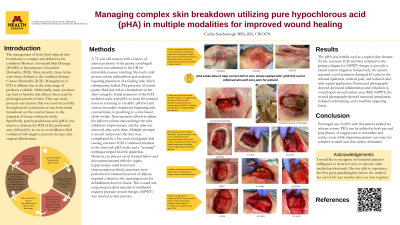Case Series/Study
(CS-138) Managing complex skin breakdown utilizing pure hypochlorous acid (pHA) in multiple modalities for improved wound healing

The management of body fluid induced skin breakdown is complex and defined as the
condition Irritant Contact Dermatitis (ICD). Management of ICD is difficult due to the wide range of products available. Additionally, many products can lead to harmful side effects when used for prolonged periods of time. This case study presents one cleanser that was used successfully throughout the continuum of care. Specifically, pure hypochlorous acid (pHA) was used as a cleanser for ICD of the periwound area, followed by its use as an instillation fluid combined with negative pressure therapy after surgical debridement.
Methods:
A 72-year-old woman with a history of adenocarcinoma of the gastric/esophageal junction was admitted to the ER for intractable nausea/vomiting. She had a mild protein calorie malnutrition and weakness requiring placement of a feeding tube which subsequently leaked. Nonoperative efforts to adjust the balloon volume and exchange the tube yielded no improvement, and the tube was removed after week three. Multiple attempts to pouch and protect the skin were complicated by a five-week total gastric leak causing extensive ICD. After this, an abscess cavity formed that communicated with the vagina. Laparoscopic small bowel and enterocutaneous fistula resections were performed. However, continued necrosis required a return to the operating room for debridement down to fascia. This wound was outputting feculent material so instillation negative pressure wound therapy (iNPWT) was selected as best practice.
Results:
The pHA was initially used as a base cleanser for the existing ICD and then switched to iNPWT therapy to provide a closed system irrigation. Subjectively, the patient reported a cool sensation, reduced pain, and reduced odor with topical application. Periwound photographs showed decreased inflammation and reduction in overall open wound surface area. With iNPWT, the wound photographs showed increased granulation, reduced undermining, and a healthier appearing fascia.
Discussion:
Prolonged use of pHA with this patient yielded no adverse events. PHA can be utilized in both pre and post phases of surgical care to streamline and reduce waste while improving patient outcomes for complex wounds and skin surface dermatitis.

.jpeg)